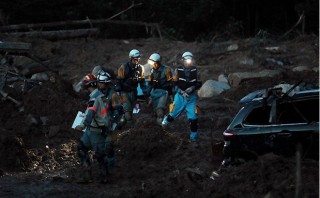Loading
Search
▼ Hiroshima Wants Public to Help Improve Evacuations
- Category:Other
HIROSHIMA--To better prepare for future disasters, the Hiroshima prefectural government will conduct public hearings to gather feedback about evacuations from the deluge in western Japan in July, which killed more than 100 people in the prefecture.
The hearings are planned to start from fall, according to prefectural sources.
Experts and prefectural officials will analyze the tendencies of how residents made their decisions to evacuate amid the torrential rain and evacuation advisories.
Based on that information, the team will examine what types of measures could prompt people to evacuate and reduce the scope of damage from disasters through early evacuation.
This type of hearing has not been conducted in Miyagi, Iwate and Fukushima prefectures, which were hard hit in the Great East Japan Earthquake and tsunami in 2011, or Kumamoto Prefecture, which was heavily damaged in a series of earthquakes in 2016.
According to the Hiroshima prefectural government, the hearings will be held in each district that suffered damage. By listening to residents tell about what made them decide to evacuate, the pattern of their reasoning will be checked in the context of behavioral psychology and behavioral economics.
The prefectural government will also evaluate how evacuation orders and instructions for cities and towns in the prefecture were conveyed.
In the Hiroshima city e-mails issuing evacuation orders and instructions, words indicating the urgency such as “promptly” and “emergency” were used.
By investigating whether those expressions led to evacuating, these will become source materials to formulate what expressions should be used in the future.
In the 2014 landslides and flooding in Hiroshima, which killed 77 people in the prefecture, victims emerged about an hour before an evacuation advisory was issued.
A prefectural officer who is in charge of disaster prevention said, “Events beyond what can be prepared for could occur. Therefore, through the hearings, we want to verify how people made judgments and want people to have a sense of evacuating early.”
(This article was written by Motofumi Watanabe and Hiroki Kitamura.)
The hearings are planned to start from fall, according to prefectural sources.
Experts and prefectural officials will analyze the tendencies of how residents made their decisions to evacuate amid the torrential rain and evacuation advisories.
Based on that information, the team will examine what types of measures could prompt people to evacuate and reduce the scope of damage from disasters through early evacuation.
This type of hearing has not been conducted in Miyagi, Iwate and Fukushima prefectures, which were hard hit in the Great East Japan Earthquake and tsunami in 2011, or Kumamoto Prefecture, which was heavily damaged in a series of earthquakes in 2016.
According to the Hiroshima prefectural government, the hearings will be held in each district that suffered damage. By listening to residents tell about what made them decide to evacuate, the pattern of their reasoning will be checked in the context of behavioral psychology and behavioral economics.
The prefectural government will also evaluate how evacuation orders and instructions for cities and towns in the prefecture were conveyed.
In the Hiroshima city e-mails issuing evacuation orders and instructions, words indicating the urgency such as “promptly” and “emergency” were used.
By investigating whether those expressions led to evacuating, these will become source materials to formulate what expressions should be used in the future.
In the 2014 landslides and flooding in Hiroshima, which killed 77 people in the prefecture, victims emerged about an hour before an evacuation advisory was issued.
A prefectural officer who is in charge of disaster prevention said, “Events beyond what can be prepared for could occur. Therefore, through the hearings, we want to verify how people made judgments and want people to have a sense of evacuating early.”
(This article was written by Motofumi Watanabe and Hiroki Kitamura.)
- August 21, 2018
- Comment (0)
- Trackback(0)


